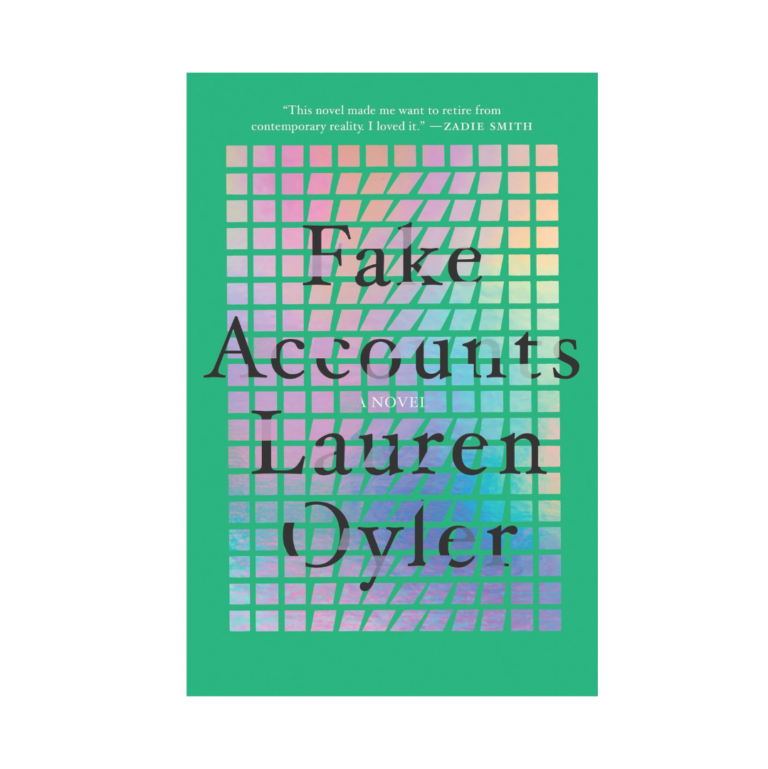Review of Fake Accounts
Catapult Books. 2021. 265 pages.
It’s 2016. Between the ongoing environmental crisis, the results of the US election, gentrification, data breaches, and patriarchy, it’s difficult to feel fazed by news of yet another horror. Even if it’s the discovery that your partner has been running an anonymous Instagram account dedicated to alt-right conspiracy theories.
In Lauren Oyler’s Fake Accounts, it is this disturbing revelation that her unnamed narrator faces after covertly unlocking her boyfriend’s, Felix, phone. Felix’s secret cements her sense of alienation, severing any emotional ties to her current life. Her response is to quit her New York media job and book a one-way ticket to Berlin, where she first met him on a pub crawl. Despite the hype surrounding this intriguing premise of Fake Accounts, the majority of the novel follows the narrator’s daily efforts to establish a new life in the German capital she had once visited as a tourist. To entertain herself, or perhaps to gain a taste for deception, she sets up a fake dating profile and manufactures lies to her roommate, employer and dates: she’s a freelance accountant one day, an acupuncturist or PhD dropout the next.
It’s clear that Oyler is attempting to engage with questions concerning performativity on social media: the construction of public personas, the deceptive nature of the Internet, and the practices we’ve reluctantly adopted as a result. From the narrator’s deliberation of the platform through which to flirt, to her use of notification previews as a means of avoiding text messages, Oyler articulates the unique considerations and adaptive behaviors we’ve learned to perform as a result of being “extremely online.” These descriptions expose the absurdity of the interactions we agonize over while simultaneously validating the neuroses we project over crafting identities both on and offline.
However, the protagonist’s cynicism swiftly undercuts any insightful analysis readers might hope to glean. According to her friends, she overcompensates for her despair with snark. During her tenure as a culture blogger, she admits, “I developed my tone, a rote, pseudo-intellectual dismissiveness that could be applied to any topic.” The narrator clearly recognizes the limitations of such an attitude, but fails to get ahead of her irony-poisoned language. Her comfort with emotionally-detached witticisms prevents her from meaningfully interrogating her observations about the rupture between IRL and URL. Instead, we’re faced with shallow, condescending remarks that reduce the potential of the Internet to dissimulation, surveillance and misinformation.
For all the time we spend when the protagonist, we never arrive at any in-depth characterization – details of her visa process are more exhaustively expounded upon than her own motivations and feelings. If this novel aims to capture the spirit of the Internet, Oyler’s attempt at revealing the superficiality of online interactions through lengthy, laboured descriptions might be more effective if they weren’t so tiresome or patronizing.
The emotional distance established by the narrator’s ironic voice is widened when Oyler employs formal gimmicks: self-referential chapter titles (“Backstory,” “Middle (Something Happens),” “Climax”), a Greek chorus of ex-boyfriends, and a section composed of distilled fragments detailing her numerous dates. Her use of the experimental structure is facetious; we are constantly reminded of her belief that “this trendy style was melodramatic, insinuating utmost meaning where there was only hollow prose.” This statement is a subtle dig at works by Jenny Offill and Maggie Nelson, but regrettably lacks the substance required to support such a snide claim.
Halfway through her writing exercise, the narrator confesses: “At some point you have to admit that doing things ironically can have very straightforward consequences.” Indeed, the outcome of exploiting a fragmented structure and sustaining a cynical tone is an empty parody devoid of plot and worthwhile cultural critique. If only the narrator could summon the strength to sincerely confront her feelings, spare an earnest thought or contemplate her cursory observations at depth, she might secure a fulfilling life outside of sarcastic quips and transactional relationships. She might finally convey the truth without hesitation.
Until then, Fake Accounts serves as a reminder that wit and style are not substitutions for substance. Yes, it’s occasionally amusing to recognize yourself in the online activities the narrator engages in, and Oyler does correctly identify a specific cultural moment worthy of further analysis. Sadly, the novel fails to probe its interests any further. Instead, the lack of vulnerability hinders the narrator’s ability to dispense anything more than condescending, broad evaluations of her digital and material worlds.
Winnie Wang is a film programmer, designer and writer based in Toronto. Their interests include pop culture, food justice, fashion, sustainability and travel.

